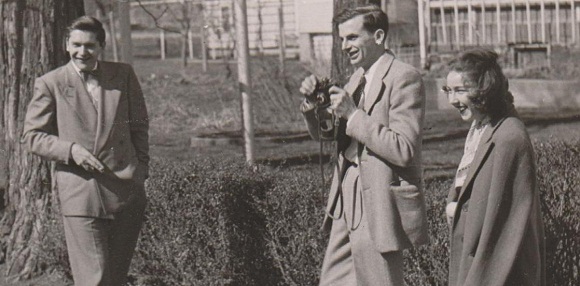9 Flannery O’Connor Quotes for the Dogged Writer in Us All
By Joe Muscolino

Robie Macauley with Arthur Koestler and Flannery O'Connor at Amana Colonies in Iowa, 9 Oct 1947
Biographile’s This Week in History remembers events of the past, and the icons that set them in motion.
Author and essayist Flannery O'Connor was born on March 25, 1925, this week in history, in the balmy port city of Savannah, Georgia. Her signature style -- a look at souls on the fringes of moral society, bent through a Catholic and Southern Gothic prism -- was highly influenced by her own upbringing.
O'Connor lived a relatively sheltered childhood, with a self-described "you-leave-me-alone-or-I'll-bite-you complex." Early on, her world was upturned by the death of her father, who struggled with lupus for four years, passing a few months before O'Connor's sixteenth birthday.
Following the sudden loss, Flannery turned her attention more doggedly to her love of writing. She joined the Iowa Writer's Workshop in 1946. "The Geranium" was O'Connor's first story, and would open the floodgates to a wealth of successive short stories, arguably O'Connor's best-known format. Indeed, the world of short stories, now inhabited by the sensitive and probing minds of Alice Munro and George Saunders, would be missing a continent of contributions had O'Connor's work gone unnoticed.
Despite being diagnosed in 1951 with the same disease that stole her father, O'Connor pursued her writing with even greater fervor. Following her diagnosis she wrote such gems as "A Good Man is Hard to Find," (1953) "Good Country People," (1955) and "Parker's Back" (1965), the last of which can be found in the short story collection Everything that Rises Must Converge, published after O'Connor's death in 1964. Upon being diagnosed with lupus, doctors gave her four years to live. She lived on for thirteen years, writing to the holy end.
Below are nine quotes to honor her perceptive mind and her lasting impact on the lettered world.
1. "Not-writing is a good deal worse than writing." (The Habit of Being: Letters of Flannery O’Connor)
2. "Anything that comes out of the South is going to be called grotesque by the northern reader, unless it is grotesque, in which case it is going to be called realistic." (Mystery and Manners: Occasional Prose)
3. "I write to discover what I know." (The Habit of Being: Letters of Flannery O’Connor)
4. "The writer should never be ashamed of staring. There is nothing that does not require his attention." (Mystery and Manners: Occasional Prose)
5. "I find that most people know what a story is until they sit down to write one."(The Habit of Being: Letters of Flannery O’Connor)
6. "I come from a family where the only emotion respectable to show is irritation. In some this tendency produces hives, in others literature, in me both."(The Habit of Being: Letters of Flannery O’Connor)
7. "Only if we are secure in our beliefs can we see the comical side of the universe."
8. "Everywhere I go, I'm asked if I think the universities stifle writers. My opinion is that they don't stifle enough of them. There's many a best seller that could have been prevented by a good teacher." (Mystery and Manners: Occasional Prose)
9. "The truth does not change according to our ability to stomach it."
